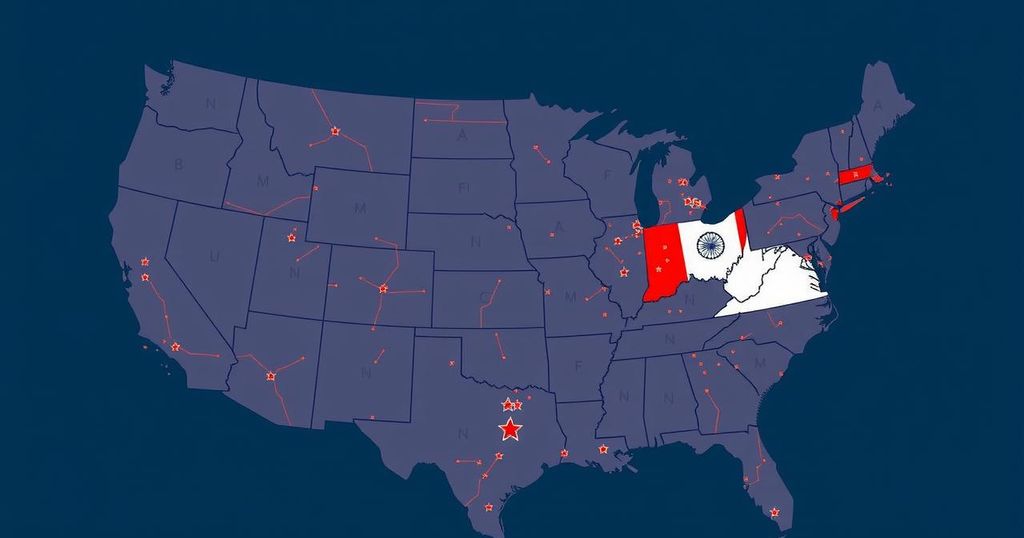Emerging reports indicate that Chinese influence operations have escalated ahead of the U.S. elections, raising alarms regarding potential meddling by targeting key Republican candidates. Microsoft highlighted that disinformation campaigns and hacking attempts—specifically involving notable figures like Donald Trump and JD Vance—illustrate a broader strategy threatening the electoral integrity. Experts urge campaigns to improve cybersecurity and work closely with government agencies to fend off foreign interference.
Allegations of intensified Chinese influence campaigns targeting U.S. election candidates are causing rising concerns about potential interference in the upcoming vote. Reports from the Microsoft Threat Analysis Center disclosed that Chinese actors have focused on Republican candidates, particularly those espousing anti-China sentiments. Despite the Chinese Embassy’s denials of election interference, the situation has drawn attention to the broader implications of such foreign influence on American democracy. In further developments, reports indicated that Chinese hackers purportedly targeted the mobile phones of former President Donald Trump and his vice-presidential contender, Senator JD Vance of Ohio. This has substantiated fears over the extent of China’s involvement in the U.S. electoral process and has prompted calls for campaigns to devise strategies to counter these threats. Kim Wyman, a former senior election security adviser, emphasized the threat posed by foreign adversaries: “From sort of a democracy standpoint, you can’t lose sight of the fact that the goal of our foreign adversaries, including China, is to destabilize America from within.” The Microsoft report detailed a disinformation initiative known as Taizi Flood, which has specifically targeted notable Republican figures, including Representatives Barry Moore and Michael McCaul, and Senators Marsha Blackburn and Marco Rubio. The campaign was accused of promoting Blackburn’s opponent, Representative Gloria Johnson, which illustrates the tactical approach employed by these disinformation operatives. During the same period, the FBI and the Cybersecurity and Infrastructure Security Agency are investigating unauthorized access linked to Chinese-affiliated actors concerning telecommunications infrastructures, although they have not confirmed whether this pertains directly to the alleged hacks. As foreign influence in elections remains a pressing issue, cybersecurity experts warn that downballot campaigns could be particularly vulnerable due to lower resource availability compared to presidential races. John Cohen, executive director of the Center for Internet Security, remarked, “Our adversaries are… looking for targets where they can have the greatest impact and support of their objectives, but they’re also looking for soft targets.” The advancement of technology, particularly artificial intelligence, has further complicated these challenges by facilitating the rapid dissemination of misleading content online. Alexandra Reeve Givens, CEO of the Center for Democracy and Technology, noted, “AI creates new, cheaper, easier tools to create misleading impacts…” Historically, the intelligence community has warned about the risk of Chinese interference, as highlighted by prior reports linking TikTok to efforts to sway the 2022 midterm elections. Lawmakers have been vocal regarding the need for robust countermeasures against disinformation and cyber threats. Experts advocate for enhanced campaign governance, strong cybersecurity practices, and cooperation with local law enforcement to mitigate risks associated with foreign interference. Morgan Ortagus, a former State Department spokesperson, stated that campaigns must bolster their cybersecurity measures and maintain proactive relationships with governmental agencies to effectively address disinformation when it arises. As the international landscape continues to evolve, the need for vigilance against foreign meddling in U.S. elections remains critical.
The discussion surrounding alleged Chinese influence in U.S. elections can be traced to multiple reports indicating that foreign actors have attempted to sway political outcomes in American election cycles. Recent allegations of a disinformation campaign targeting specific candidates, particularly those critical of China, have precipitated heightened scrutiny and concern among lawmakers and security experts alike. The involvement of technology, especially social media and AI tools, serves to amplify these risks and complicate responses to potential manipulation of voter perception. The intelligence community and cybersecurity experts have, historically, warned about the implications of such foreign interference and the need for comprehensive defense mechanisms to safeguard democratic processes.
In conclusion, the potential for Chinese influence in the U.S. electoral process raises significant concerns regarding national security and the integrity of democracy. With targeted disinformation campaigns and potential hacking incidents, there is an urgent need for robust cybersecurity protocols and strategies among campaigns. Collaboration with government entities, an understanding of cyber threats, and comprehensive counter-measures against misleading information are imperative to counteract foreign interference effectively. The evolving technological landscape necessitates a proactive approach to protect U.S. elections from foreign manipulation.
Original Source: thehill.com






